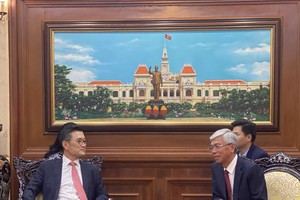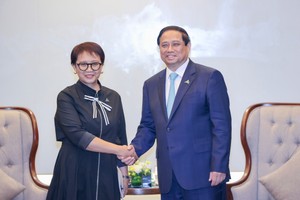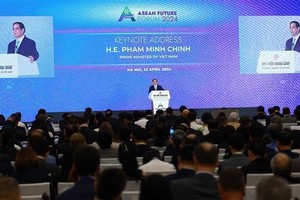On Jan. 14, there was a commemoration of the life and work of Richard Holbrooke, the American diplomat extraordinaire, and most recently Special Representative for Afghanistan and Pakistan, who died at the age of 69 on December 13.
His true memorial, however, will come only if and when the war in Afghanistan is brought to an end in a way that does justice to the blood and treasure, Afghan and international, that has been spilt and spent over the last nine years. The lives of over 100,000 American troops, and millions of Afghans - never mind the future of Pakistan - depend on the right lessons of Holbrooke's service being applied now.
I got to know Holbrooke well over the last four years. Nicknamed the "bulldozer," he was more of a bulldog - with a fierce bark but a tender nature. The Afghanistan-Pakistan beat was not his job of choice, but he saw a patriotic duty in taking it on. (See "Richard Holbrooke's Legacy: The Power of Limited War.")
Holbrooke was a huge admirer of the bravery and intelligence of the U.S. military. But he cautioned against the "militarization of diplomacy." It is a resonant and important phrase. It is good that army commanders study the sociology as well as the topography of the countries in which they are deployed. But it is not a substitute for the diplomatic statecraft that makes for sustainable societies. David Petraeus would not be credited with turning Iraq round if it had not been for U.S. Ambassador Ryan Crocker.
Holbrooke knew from his experience from Vietnam to the Balkans that insurgencies and civil wars are never ended by force. They depend on a political settlement that holds firm on basic rules but also seek the widest possible accommodation of interests within the political system. In Afghanistan that means all the tribes in, al Qaeda out, the neighbors onside. (See TIME's video of notable deaths in 2010, including Holbrooke.)
I read Steve Coll's Pulitzer Prize winning Ghost Wars over the holiday. He quotes Peter Tomsen, the U.S. Special Envoy to the Afghan Resistance, concluding in 1990 that the only model for governing Afghanistan was "the decades between 1919 and 1973 when Zahir Shah's weak but benign royal family governed from Kabul and a decentralised politics prevailed in the countryside, infused with Islamic faith and dominated by tribal or clan hierarchies".
There will be no Royal return to Kabul. But the political model is right. And Afghanistan needs that drive for a political settlement now. Foreign forces, now numbering 32,000 in Helmand province alone, are suppressing the insurgency. The military tempo, despite the winter, is unremitting, as special forces "disrupt and dismantle" - in other words kill - Taliban fighters.
However, the Wall Street Journal reported in December unpublished U.N. security assessments which showed a marked deterioration in the security situation in 2010. The U.N. spokesman confirmed that "in the course of 2010, the security situation in many parts of the country has become unstable where it previously had not been so." (See Michael Elliott's remembrance of Holbrooke.)
This tallies with extremely worrying reports of the insurgency spreading into the far north of the country, and mutating from local power struggles into organizations more deeply committed to global jihad.
There is a simple point here: you can squeeze the air out of one part of the balloon, but it will appear elsewhere, possibly with more danger of going pop. But there is also a far more profound issue: Afghanistan's battles are not just between the Afghan and foreign forces and the Taliban insurgency, but between (and within) Afghanistan's often warring tribes. They know western patience is wearing thin; NATO has been there longer than the Russians. And also that while parts of the Afghan National Army are being trained well, it is a basically Tajik force seen as the enemy by many Pashtuns. (Comment on this story.)
All this means that the need for a twin track political strategy is more urgent than ever. State or international security forces will not stabilize the country; only a peace deal can do that.
Track one is an internal political settlement. Western influence on this is limited at the moment to ineffective and unspecified "pressure" on President Karzai. It needs to be far more up front in its recognition of what the end game will be: a decentralized series of political settlements in the villages and valleys of Afghanistan, with national and international forces limited to preventing the overthrow of government in Kabul and al Qaeda taking root. (See more about what it will take to finish the job in Afghanistan.)
But this track will never get going unless track two - the track of regional political engagement - has real legs. This needs to be a series of agreements which recognize the divergent interests of the different neighboring countries, from Pakistan to Iran. At the moment, it is a free for all, with a number of states backing all sides. It is a recipe for the slide to ethnic and even civil war that would be the most awful epitaph to western engagement in Afghanistan.
Every one of the regional powers, Pakistan especially, would gain from an Afghanistan no longer exporting drugs, extremism and refugees. But none of these countries will gain anything if they hold out for Afghanistan to be their client state.
This kind of drive is a massive ask of politicians in Washington and allied capitals and in the region. But it is precisely what politicians, not generals, are for. And the alternative is far worse.
Richard Holbrooke knew that drift saps the credibility of great powers. There is a real danger now that ennui and complexity feeds drift. Debating dates for withdrawal is a distraction - and a falsely comforting one at that. The key is, and always has been, a political settlement which can make withdrawal possible on terms that protect regional and global interests. Holbrooke is gone, but we must learn his lessons.
























